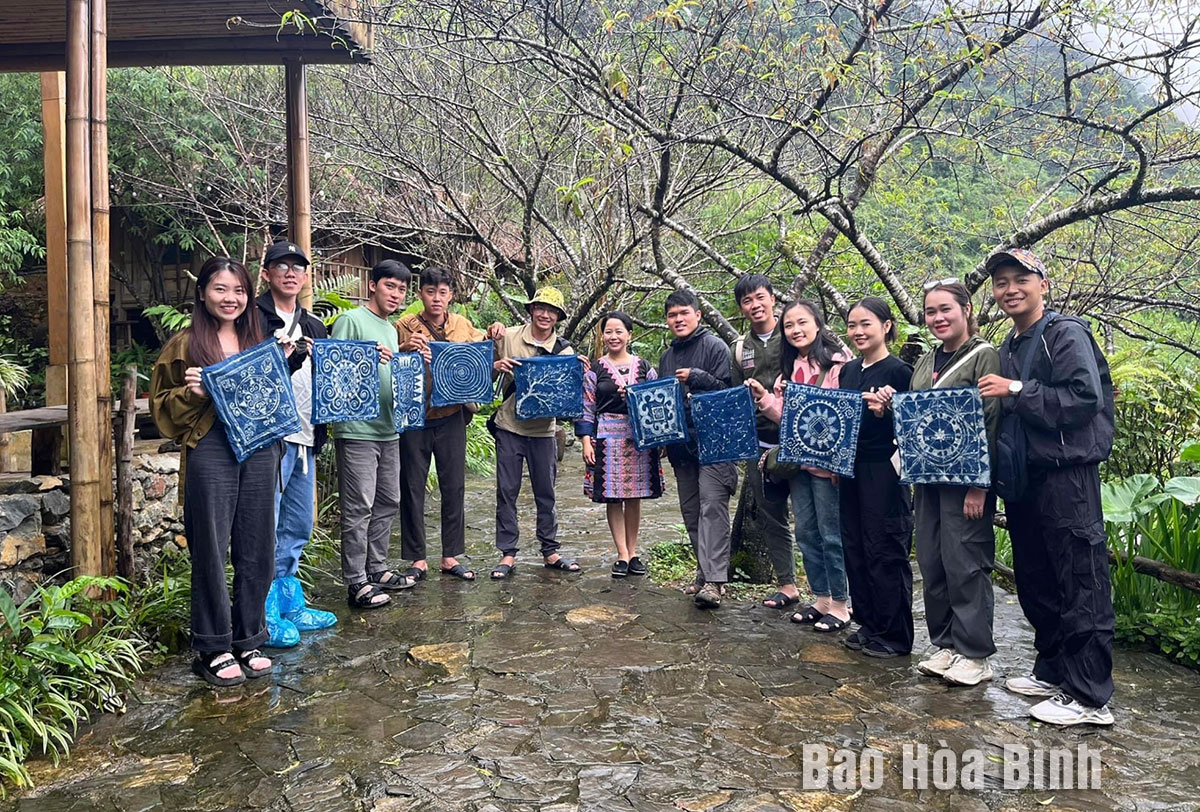



Ms. Sung Y Mua (wearing Mong ethnic costumes) and the tourists after being taught how to dye the fabric of Mong ethnic people.
Visiting Hang Kia village on a cool day, the lovely stilt house of Ms. Y Mua's family is located right next to the main road. She took us on a tour around her property, we were attracted by the rusticity and the traditional national cultural identity clearly shown in the architecture as well as the arrangement of the objects inside the house. At Y Mua Homestay right now, foreign tourists are excited to experience beeswax painting. Talking about the fate when deciding to do community tourism, Ms. Y Mua says: The creator has given this land beautiful natural landscapes and a cool climate. Furthermore, Mong community in Hang Kia also preserves many cultural features such as the traditional costumes, cuisine, embroidery, weaving, indigo dyeing, beeswax painting, and blacksmithing... This is the local potential that few places still have. Exploiting that strength, over the past 10 years, Y Mua has continuously been trying to build a resort to welcome guests, both to increase income and contribute to the local tourism development.
Y Mua uses her stilt house in Hang Kia hamlet as a place to welcome guests. The tourists coming here are mainly foreigners. They are here to learn and experience the local culture through the very everyday work of Mong people. They are embroidery, beeswax painting, dyeing fabric, making Do paper... In the first days, she was also surprised about the need for experience and quite confused in welcoming guests. However, she has gradually built an interesting experience program to better serve tourists.
Along with improving the service quality, Y Mua actively shares and promotes the family's homestay image through social networking sites. Thanks to that, the number of tourists knowing and staying here has increased year by year. From having only one community house on stilts, the homestay has been expanded with many surrounding Bungalows to meet the relaxation and experience needs of tourists. After more than a decade of opening to welcome tourists, Y Mua has reaped "sweet fruits”. Every year, up to thousands of domestic and foreign tourists come to her family's resort. Y Mua Homestay has become a familiar destination for many tourists from Ho Chi Minh City, Da Nang, Hanoi... or from France, Germany, Spain, England, and Australia... they are all satisfied when leave a guestbook.
The gradual expansion of Y Mua Homestay also means that the local workers have more job opportunities. With the number of tourists staying, the homestay attracts about 250 people on average each month. This place creates jobs for 4-7 employees, during the peak times the number of employees increases to 7-10, with an average income of 4-5 million VND a person a month. Looking at the recent achievements, community tourism is like a ray of sunshine illuminating the entire Hang Kia valley. From a small ethnic minority woman with the thoughts and enthusiasm towards the whole community, she has significantly contributed to the inspiration and she is an example of the village and the highlands.
Mr. Kha A Lau, the Chairman of the People's Committee of Hang Kia Commune, says: Not only does the good production and business bring the results to herself and her family, Ms. Sung Y Mua is always concerned and enthusiastic about helping and guiding the households in the village to do tourism together, making efforts to escape hunger and poverty, contributing to the local socio-economic development. Y Mua and her husband have helped dozens of Hmong households in Hang Kia open homestays. Mong people also gradually change their production thinking. They have known how to take advantage and exploit the local advantages for the economic development. In addition, Y Mua is also a typical example of the charity and humanitarian work in the locality. Through connecting with many benefactors, she has called on the charity groups to donate the school supplies and warm clothes to the students in the schools and the people in Hang Kia and Pa Co communes.
With her efforts in production and business and her contributions to the local socio-economic development, in 2021, Ms. Sung Y Mua was honored to be awarded a certificate of merit by the Chairman of the Provincial People's Committee for the outstanding achievements in production - business in the period of 2018 - 2020.